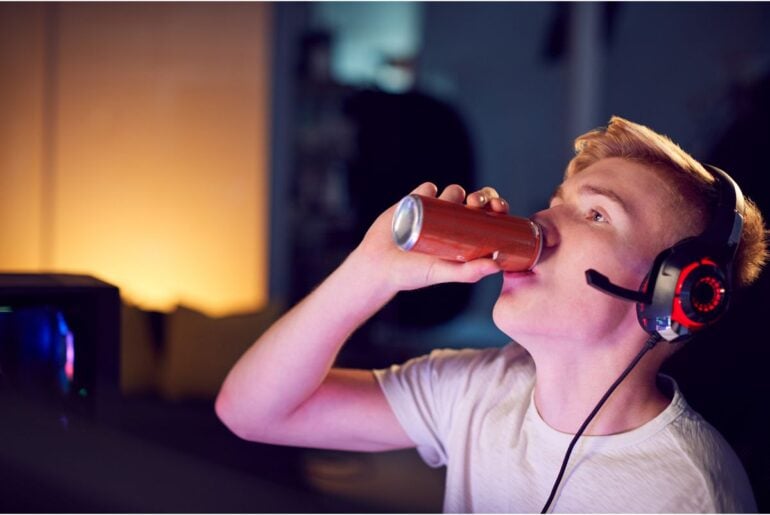The rows of eye-catching, brightly colored cans lining your grocery store’s beverage aisle are hard to miss. And if you happen to be shopping with your kids, you probably won’t be able to make it to the checkout line without hearing “Can we please get these?” Before tossing them into your cart, however, make sure to take a closer look at what you’re being asked to buy — they may not be your run-of-the-mill soft drink.
Many of these beverages are actually energy drinks containing an extremely high caffeine content — and they’re packaged and promoted specifically to appeal to younger consumers. Despite their innocent appearance, however, these beverages can pose real health risks to kids and teens.
Understanding caffeine limits for kids
Many adults love a good cup of coffee (or two) to start their day. While 400 milligrams of caffeine each day is considered safe for the majority of healthy adults, the amount of caffeine that children and adolescents can safely consume is unknown. The American Academy of Pediatrics (AAP) recommends that kids under the age of 12 do not consume caffeinated drinks at all, while adolescents between the ages of 12 and 18 should limit their intake to less than 100 milligrams per day — but some energy drinks on the market can contain twice that amount.
A quick fix with a downside
These days, many kids are booked and busy between school, activities, and extracurriculars — and a super busy kid also makes for a tired kid. Especially for impressionable teens eager to try what the hottest online influencers are touting, the idea of a simple drink that can give them a boost holds a lot of appeal.
“Companies are marketing these drinks as giving children ‘energy,’ but the truth is energy drinks give kids a harmful caffeine rush and a crash afterwards,” says Dr. Edith Bracho-Sanchez, director of pediatric telemedicine at NewYork-Presbyterian’s Ambulatory Care Network and assistant professor of pediatrics at Columbia University Vagelos College of Physicians and Surgeons. “We have to reframe the conversation. Energy should come from a good night’s sleep, a nutritious meal with protein and vitamins, and limiting screen time, so kids can perform throughout the day.”
A warning about kratom
Parents should also be aware of another trendy and potentially dangerous ingredient found in some energy drinks. Kratom is a plant-based ingredient sourced from a Southeast Asian plant. Sounds innocent enough, but it can actually have serious adverse effects on adolescent users. It can cause stimulant and opioid-like effects, yet is a perfectly legal additive that claims to help users focus, stay calm, and boost energy. On the contrary, kratom can lead to tachycardia (rapid/elevated heart rate), arrhythmia (irregular heartbeat), and alarmingly, even addiction to its effects.
Hydration drinks vs. energy drinks
Hydration drinks are another popular drink option on the market. Unlike energy drinks, these beverages are uncaffeinated and contain electrolytes and sugar. While these drinks may sound like a healthier alternative, the sugar content in them can actually be quite high. The amount can vary by brand, so it’s important to read labels so you can make an informed choice. Look for the number of grams per bottle, and keep an eye out for alternate terms for sugar listed on the label (sucrose, glucose, fructose, and dextrose are common ones).
Guiding healthy hydration habits
Above all, water remains the optimal choice for hydration, and you can increase its appeal by adding flavor boosters like fresh citrus or berries or letting your child personalize their water bottles. Milk is also a great, healthy option for younger kids.
Finally, parents should model good hydration habits and talk to their child or teen about energy drink risks. Remember that setting firm boundaries with your child — even when met with pushback — will ultimately benefit their long-term health and well-being. Though your kid may initially resist your refusal to give in to their request, your guidance now will foster healthier habits they’ll appreciate as they grow.
Sources:
-
HealthyChildren.org (American Academy of Pediatrics), “The Effects of Caffeine on Kids: A Parent’s Guide”
-
Johns Hopkins Medicine, “Energy Drinks and Kids: What You Need to Know”
-
New York-Presbyterian Health Matters, “Are Energy Drinks Safe for Kids?”
-
American Heart Association, “How Much Sugar Is Too Much?”
-
Parents.com, “Some Energy Drinks Contain a Potentially Addictive Ingredient—What Parents Need To Know”







